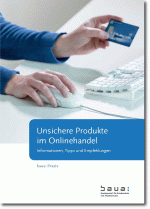The risks of buying online and how to avoid them

The Internet is an ideal means for customers to shop conveniently, quickly and easily for products of all kinds, but only as long as the products they buy are actually safe. Here, the Federal Institute for Occupational Safety and Health (BAuA) offers an insight into the problems associated with e-commerce as well as tips on how to shop safely.
Over millions of private purchases are made over the Internet in Germany every year. Around 100 billion euros are turned over in online trade. The share of total retail sales is rising steadily. Customers order not only from domestic shops, but increasingly also from shops outside the European Union (EU), for example in China or the USA. However, buying online is also associated with certain risks that customers should be aware of. If followed, these tips from the Federal Institute for Occupational Safety and Health (BAuA) can help to reduce the risks of shopping online.
Tips for buying online
One of the problems is that, at the click of a mouse, many unsafe products that are not approved in the EU can enter the market and end up in the hands of consumers.
This happens despite intensive work on the part of authorities, which take hundreds of thousands of non-compliant products from circulation across Europe every year. However, it is clear that state control alone is not enough to protect the market and consumers from unsafe products. After all, the potentially dubious contents of packages or parcels dispatched by online retailers are not obvious at first glance.
Especially on the Internet, it is not easy to differentiate between compliant products on the one hand and dangerous or counterfeit ones on the other. Before buying, therefore, customers should inform themselves not only about the product but also about the trader and the distribution channel.
In Germany and the EU, a variety of laws are in place to protect both consumers and commercial buyers. In e-commerce, the distributors and manufacturers are often located outside the EU, where the applicable consumer rights may be different or severely limited. If a product causes injury despite being used correctly, it is usually the manufacturer, distributor or importer that is liable. If the product does not originate from within the EU, it can be difficult to obtain replacements or to file complaints. The website's legal notice should always include details of where an online distributor is based.
Customers can inform themselves in advance not only about the distributor but also about the product. For example, unusually cheap prices may be a sign of counterfeits. It is therefore advisable to compare prices before buying - including with offers from local retail shops. Relevant product safety databases also provide information on whether a product has already attracted negative attention.
Guidance for buying online
BAuA provides guidance for buying safe products online in the publication "Unsafe Products in Online Trading - Information, Tips and Recommendations" (Unsichere Produkte im Onlinehandel - Informationen, Tipps und Empfehlungen). In addition to numerous practical tips and explanations regarding e-commerce, this publication includes a checklist to help people identify problematic distributors and unsafe or counterfeit products. Ideally, you should examine the specific supplier's website more closely based on the questions in the checklist.
If the answer to one of these questions is negative, customers should think again about buying the product and/or about the chosen supplier. There is limited scope for liability claims in such situations. Gaining access to the distributor is problematic, and possible returns or reimbursements of the purchase price are sure to be difficult.
Market surveillance in the world of e-commerce
One problem that market surveillance authorities are increasingly facing is the fact that products are delivered to end customers directly. Particularly via sales platforms or online shops, unsafe products also make it into Germany - reaching both distributors and end users alike. These products don't always meet the safety requirements set out in legislation on the internal market.
Market surveillance authorities are relatively powerless against these imports, as well as against private imports. As yet, they have almost no means at their disposal to deal with the parties involved in these sales - who are often located outside the European Union - in the same way as they do with local distributors. While the official mechanisms operate primarily at the national level, and at the European level if need be, they have little or no effect in countries outside Europe. In addition, there are some economic operators - such as sales platforms or fulfilment centres - against which market-surveillance measures are virtually powerless, but which play a significant role in online trading.
With the study "Advancements of BAuA's Product Safety Portal: Internet Trade and Product Safety" (Weiterentwicklung des BAuA-Produktsicherheitsportals: Internethandel und Produktsicherheit), BAuA highlights legal and organisational possibilities for the further development of market surveillance in the world of e-commerce. The study also analyses the stakeholders involved in e-commerce, such as platform operators and fulfilment centres, and describes the typical selling methods and their hidden dangers: online shops, online auction houses, portals acting as intermediaries, and classifieds markets.


